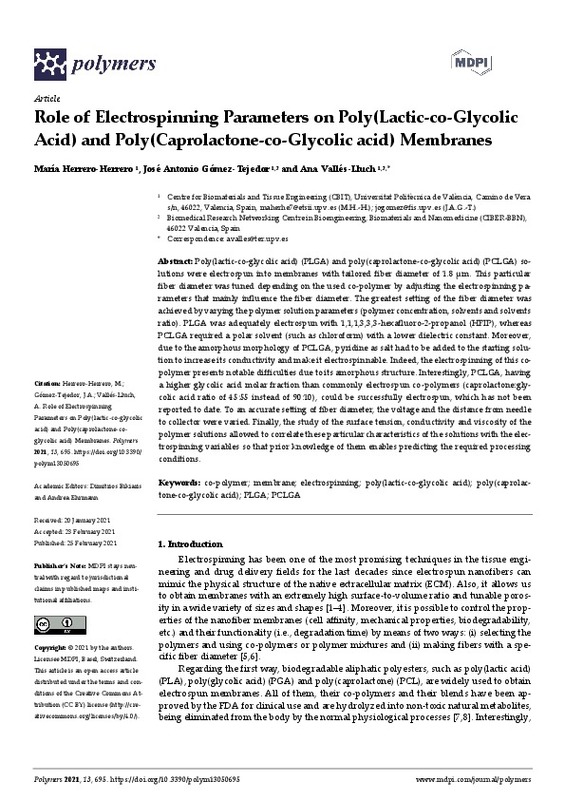JavaScript is disabled for your browser. Some features of this site may not work without it.
Buscar en RiuNet
Listar
Mi cuenta
Estadísticas
Ayuda RiuNet
Admin. UPV
Role of Electrospinning Parameters on Poly(Lactic-co-Glycolic Acid) and Poly(Caprolactone-co-Glycolic acid) Membranes
Mostrar el registro completo del ítem
Herrero-Herrero, M.; Gómez-Tejedor, J.; Vallés Lluch, A. (2021). Role of Electrospinning Parameters on Poly(Lactic-co-Glycolic Acid) and Poly(Caprolactone-co-Glycolic acid) Membranes. Polymers. 13(5):1-11. https://doi.org/10.3390/polym13050695
Por favor, use este identificador para citar o enlazar este ítem: http://hdl.handle.net/10251/181514
Ficheros en el ítem
Metadatos del ítem
| Título: | Role of Electrospinning Parameters on Poly(Lactic-co-Glycolic Acid) and Poly(Caprolactone-co-Glycolic acid) Membranes | |
| Autor: | ||
| Fecha difusión: |
|
|
| Resumen: |
[EN] Poly(lactic-co-glycolic acid) (PLGA) and poly(caprolactone-co-glycolic acid) (PCLGA) solutions were electrospun into membranes with tailored fiber diameter of 1.8 mu m. This particular fiber diameter was tuned depending ...[+]
|
|
| Palabras clave: |
|
|
| Derechos de uso: | Reconocimiento (by) | |
| Fuente: |
|
|
| DOI: |
|
|
| Editorial: |
|
|
| Versión del editor: | https://doi.org/10.3390/polym13050695 | |
| Código del Proyecto: |
|
|
| Agradecimientos: |
M. Herrero acknowledges the Spanish Ministerio de Economia y Competitividad for the BES-2016-078024 grant. A.Valles acknowledges the support of the Generalitat Valenciana, Conselleria de Educacion, Investigacion, Cultura ...[+]
|
|
| Tipo: |
|









